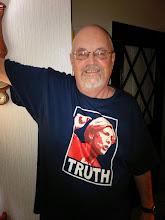Many of my friends from Wisconsin have supported and
voted for Dennis Kucinich, a man whose politics and beliefs I totally agree
with—especially the establishment of a Department of Peace. However, I am also a realist and feel that,
when I cast my ballot for president, it is something I have to take very
seriously and not toss it away on a candidate who stands absolutely no chance
of being elected. I may as well not vote
at all. I want my vote to be the counted
and to make a difference.
For example, in 1844 in backwoods Indiana a dying man had
his sons take him to the polls in order that he might cast his ballot for David
Kelso, a lawyer who had successfully defended him against a murder charge. Kelso, a Democrat, won election by that one
vote. The Indiana Senate was evenly
split between Democrats and Whigs. At
that time, the various state legislatures elected the respective U.S. Senators
and the evenly split Indiana senate could not elect a Senator. Kelso bolted the caucus, taking with him a
Whig senator until, several weeks later, he returned and nominated Edward
Hannigan as senator. Kelso told his
Democrat colleagues that, unless they supported him, he would vote with the
Whigs. Hannigan was then elected to the Senate. The following year the U.S. Senate was
debating over whether to admit Texas as a state. The most prominent candidate before Hannigan
had pledged to vote against Texas statehood.
Hannigan’s vote to admit Texas was the deciding vote. Thus, it could be argued the vote of a dying
man in the wooded hills of Indiana made Texas a state.
In the election of 2000, Florida had the dubious
distinction of forcing the election into the hands of nine unelected people,
due in large part to the seeming inability of many voters not grasping the
importance of their vote. As the votes
were being counted and recounted, by the time the Supreme Court had halted the recount,
the votes that had been counted showed that George W. Bush had received 2,912,790
votes; Al Gore 2,912,253 votes—a difference of 537 votes-- and Ralph Nader
97,488 votes. If only 1 percent of those
who voted for Nader had voted for Gore, the results may have been drastically
different—and our world along with it.
There is no argument from me that our political system is
grievously flawed and that there are moneyed forces at work trying to subvert
the process and own it. It is for us,
the governed, to do what we can to keep our birthright to vote as American
citizens. The days of poll taxes are far
behind us and now everyone who is eligible to vote has that right without
regard to education, gender, race, religion, or any other qualification.
While I respect anyone who votes his or her conscience, I
would counsel them to make sure their vote will make a difference. I admire those who vote their conscience and
would not deny them that right. I do not
condemn them for it, but would remind them that for want of a nail, the shoe
was lost…
Each and every vote cast does make a difference, only as long as it is not cast as a protest
and not intended to make a difference.
Simply look back on Senator Hannigan and what one solitary man’s vote
meant.

No comments:
Post a Comment